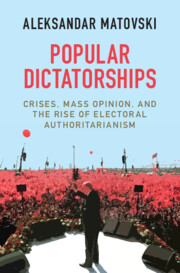Crossref Citations
This Book has been
cited by the following publications. This list is generated based on data provided by Crossref.
Nadporozhskii, Ilia
2023.
Influence of elite rotation on authoritarian resilience.
Democratization,
Vol. 30,
Issue. 5,
p.
794.
Jungherr, Andreas
2023.
Artificial Intelligence and Democracy: A Conceptual Framework.
Social Media + Society,
Vol. 9,
Issue. 3,
Sharafutdinova, Gulnaz
2024.
Authoritarian welfare and resilience: politics of child benefits in Russia.
Post-Soviet Affairs,
Vol. 40,
Issue. 4,
p.
326.
Zeng, Yu
He, Junzhi
and
Lü, Xiaobo
2024.
Constituency Service and Valence Voting in Semi-Competitive Elections: Theory and Evidence From China.
Political Studies,
Neundorf, Anja
Ozturk, Aykut
Northmore-Ball, Ksenia
Tertytchnaya, Katerina
and
Gerschewski, Johannes
2024.
A Loyal Base: Support for Authoritarian Regimes in Times of Crisis.
Comparative Political Studies,
Birch, Sarah
2024.
Semi-parliamentarism and the challenges of institutional design.
Critical Review of International Social and Political Philosophy,
Vol. 27,
Issue. 2,
p.
266.
LUCAS, JACK
SHEFFER, LIOR
LOEWEN, PETER JOHN
WALGRAVE, STEFAAN
SOONTJENS, KAROLIN
AMSALEM, ERAN
BAILER, STEFANIE
BRACK, NATHALIE
BREUNIG, CHRISTIAN
BUNDI, PIRMIN
COUFAL, LINDA
DUMONT, PATRICK
LACHANCE, SARAH
PEREIRA, MIGUEL M.
PERSSON, MIKAEL
PILET, JEAN-BENOIT
RASMUSSEN, ANNE
STERBA, MAJ-BRITT
and
VARONE, FRÉDÉRIC
2024.
Politicians’ Theories of Voting Behavior.
American Political Science Review,
p.
1.
Aarslew, Laurits F.
2024.
Does Election Fraud Erode Support for Autocrats?.
Comparative Political Studies,
Vol. 57,
Issue. 12,
p.
1978.
Del Real, Deisy
and
Menjívar, Cecilia
2024.
The Tools of Autocracy Worldwide: Authoritarian Networks, the Façade of Democracy, and Neo-Repression.
American Behavioral Scientist,
Vol. 68,
Issue. 12,
p.
1559.
Zeng, Yu
He, Junzhi
and
Lu, Xiaobo
2024.
Constituency Service and Valence Voting in Semi-Competitive Elections: Theory and Evidence of China.
SSRN Electronic Journal,
LETSA, NATALIE WENZELL
2024.
Partisanship and Political Socialization in Electoral Autocracies.
American Political Science Review,
p.
1.



